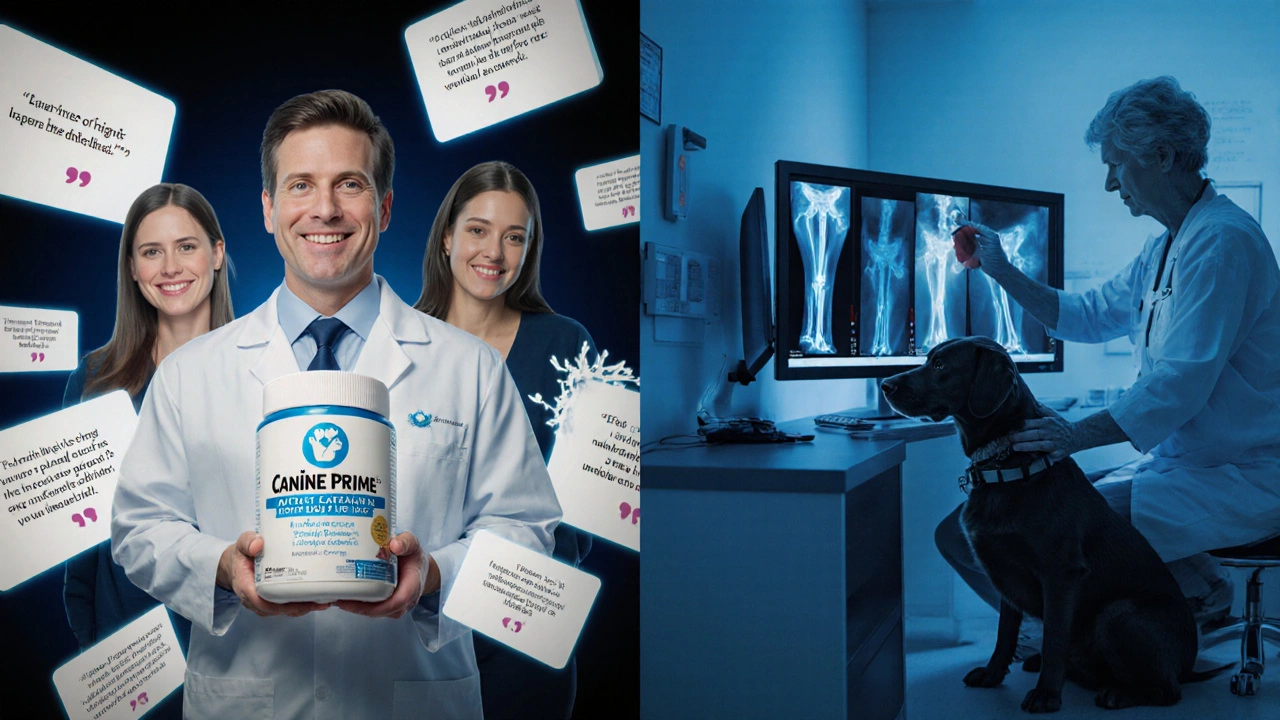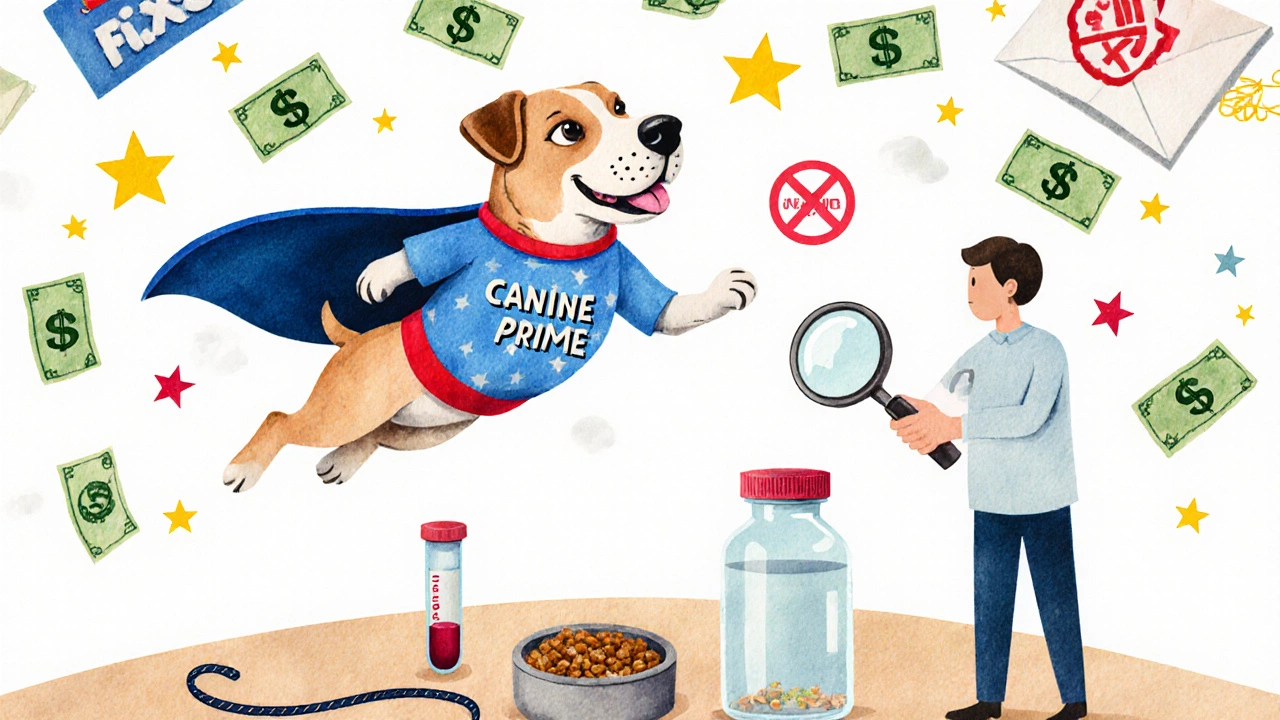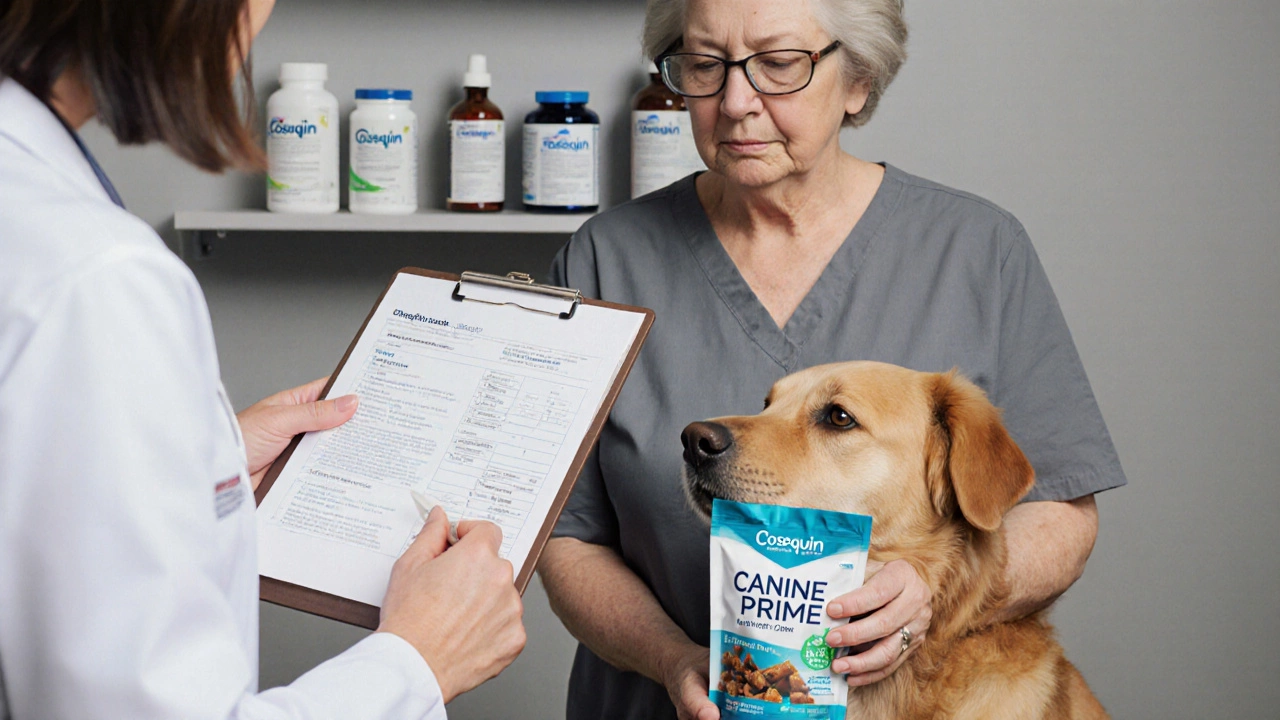If you’ve seen ads for Canine Prime, you’ve probably wondered: do vets actually recommend it? The answer isn’t simple. Some vets might suggest it. Others won’t even know what it is. And that’s the problem - Canine Prime isn’t a prescription product. It’s a supplement sold online, with bold claims and slick packaging. But when it comes to your dog’s health, marketing doesn’t replace science.
What Is Canine Prime?
Canine Prime is a daily chewable supplement marketed to improve joint health, skin condition, digestion, and energy in adult dogs. It contains ingredients like glucosamine, chondroitin, omega-3 fatty acids from fish oil, probiotics, and antioxidants like vitamin E. These aren’t unusual ingredients - you’ll find them in many vet-approved joint supplements. But what sets Canine Prime apart is how it’s sold: through YouTube ads, influencer testimonials, and limited-time offers.
The company claims it’s "formulated by veterinarians," but doesn’t name any. No clinical trials are published. No peer-reviewed studies back up their specific formula. That’s not necessarily a red flag - many pet supplements operate this way. But it’s also not proof it works better than cheaper, vet-recommended brands.
What Do Vets Actually Say About Dog Supplements?
Most veterinarians don’t dismiss supplements outright. They know many dogs benefit from targeted nutrition. But they also know the market is flooded with overpriced, under-tested products. A 2023 survey by the American Veterinary Medical Association found that 68% of vets have been asked about commercial dog supplements in the past year. Only 23% said they regularly recommend any brand without conditions.
Vets are more likely to suggest supplements if:
- The dog has a diagnosed condition - like osteoarthritis or inflammatory bowel disease
- The supplement has clear, documented ingredients and dosages
- The product is manufactured under GMP (Good Manufacturing Practices) standards
- There’s independent lab testing for purity and potency
Canine Prime doesn’t publish lab reports or list its manufacturing facility. That makes it hard for a vet to confidently endorse it. You can’t trust a vet to recommend something they can’t verify.
How Does Canine Prime Compare to Vet-Approved Alternatives?
Let’s compare Canine Prime to two supplements most vets actually recommend: Dasuquin and Cosequin.
| Feature | Canine Prime | Dasuquin | Cosequin |
|---|---|---|---|
| Key Ingredients | Glucosamine, chondroitin, fish oil, probiotics, vitamin E | Glucosamine, chondroitin, ASU (avocado/soybean unsaponifiables) | Glucosamine, chondroitin |
| Independent Lab Testing | No public reports | Yes, published on manufacturer site | Yes, published on manufacturer site |
| Vet-Recommended | Not commonly | Yes, widely | Yes, widely |
| Price (for 60 chews, 50-lb dog) | $59.99 | $65.99 | $49.99 |
| Manufacturer Transparency | Low - no facility or contact info | High - Nutramax Labs, founded 1993 | High - Nutramax Labs, founded 1993 |
Dasuquin and Cosequin have been studied in clinical trials. They’re sold through veterinary clinics and pharmacies. You can’t buy them on Amazon without a prescription in many cases - and that’s by design. Vets want to control quality and ensure dogs get the right dose.
Canine Prime costs about the same as Cosequin, but you’re paying for ads, not assurance.

Why Do People Think Vets Recommend Canine Prime?
The marketing is clever. Ads show happy dogs running, with a voiceover saying, "My vet told me about this!" But those aren’t real vets. They’re actors. The website has fake testimonials with names like "Sarah from Ohio" - no last names, no clinic logos, no way to verify.
Some vets have spoken out. Dr. Lisa Peterson, a board-certified veterinary nutritionist in Texas, said in a 2024 interview: "I’ve had clients come in with Canine Prime and ask if it’s safe. I tell them it’s probably not harmful, but it’s also not proven to do anything special. If you’re spending $60 a month, spend it on a blood test instead. That tells you what your dog actually needs."
That’s the real issue: supplements like Canine Prime distract from real diagnostics. Instead of checking for thyroid issues, food allergies, or early arthritis, owners think a daily chew will fix everything.
When Might a Vet Recommend a Supplement Like This?
There are times when a vet might suggest a similar product - but only if:
- Your dog has mild joint stiffness and is too young for prescription pain meds
- You’re trying to avoid NSAIDs due to kidney concerns
- You’ve tried a vet-approved brand and your dog won’t eat it
Even then, vets usually recommend products with:
- Clear dosing based on weight
- Third-party certification (like NSF International or NASC)
- Ingredients backed by published research
Canine Prime doesn’t meet any of those standards. If your vet says yes to it, ask: "Can you show me the lab report?" If they can’t, they’re guessing.

What Should You Do Instead?
If you’re worried about your dog’s joints, skin, or digestion, start here:
- Get a full senior blood panel if your dog is over 7 years old
- Ask your vet for a joint health assessment - X-rays cost less than 2 months of Canine Prime
- Try a vet-recommended glucosamine brand like Cosequin or GlycoFlex
- Switch to a high-quality dog food with omega-3s - many now include joint support
- Keep your dog at a healthy weight - that’s the #1 thing that helps joints
Most dogs don’t need fancy supplements. They need movement, good food, and regular checkups. A $50 monthly chew won’t replace those.
Is Canine Prime Safe?
It’s likely not dangerous. The ingredients are common and generally safe in the doses listed. But because it’s not regulated like a drug, there’s no guarantee what’s actually in each chew. A 2022 study by the FDA found that 22% of dog supplements sold online contained unlisted pharmaceuticals - including steroids and painkillers.
Canine Prime hasn’t been flagged, but without transparency, you’re taking a risk. If your dog has liver disease, kidney issues, or is on other meds, mixing supplements without vet approval could be harmful.
Always tell your vet about every supplement your dog takes - even if you think it’s "just a chew."
Final Verdict
Do vets recommend Canine Prime? Rarely. Not because they’re against supplements. But because they’re for effective ones. Canine Prime looks good on screen. But when you look under the hood - no lab results, no vet names, no clinical proof - it doesn’t hold up.
If you want to support your dog’s health, spend your money on a vet visit, not an ad. Real health doesn’t come from a YouTube influencer. It comes from science, testing, and a vet who knows your dog’s history.
Is Canine Prime FDA approved?
No, Canine Prime is not FDA approved. The FDA doesn’t approve pet supplements - only drugs. But the FDA does regulate safety and labeling. Canine Prime doesn’t list its manufacturing facility or provide independent lab test results, which raises red flags about quality control.
Can I give Canine Prime to my puppy?
The manufacturer says it’s for adult dogs over 1 year old. Puppies have different nutritional needs, and most don’t need joint supplements unless they have a genetic condition like hip dysplasia. Giving adult formulas to puppies can lead to imbalances. Always check with your vet before giving any supplement to a puppy.
Does Canine Prime help with arthritis?
It contains glucosamine and chondroitin - ingredients that have shown mild benefits in some studies for arthritis. But Canine Prime doesn’t disclose the exact amounts of these ingredients, so you can’t know if it’s enough to help. Vet-recommended brands like Dasuquin use clinically proven doses. Without that data, Canine Prime’s effectiveness for arthritis is uncertain.
What are the side effects of Canine Prime?
Most dogs tolerate it well. But some owners report loose stools, especially when starting the supplement - likely due to the probiotics or fish oil. Dogs with fish allergies may react. If your dog vomits, stops eating, or seems lethargic after starting Canine Prime, stop immediately and call your vet.
Is there a money-back guarantee?
Yes, the company offers a 90-day money-back guarantee. But you’ll need to contact customer service directly, and return unused portions. Many customers report delays in refunds or difficulty reaching support. It’s better to invest in a vet-approved product with clearer return policies and professional backing.

